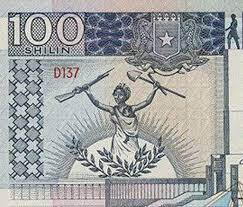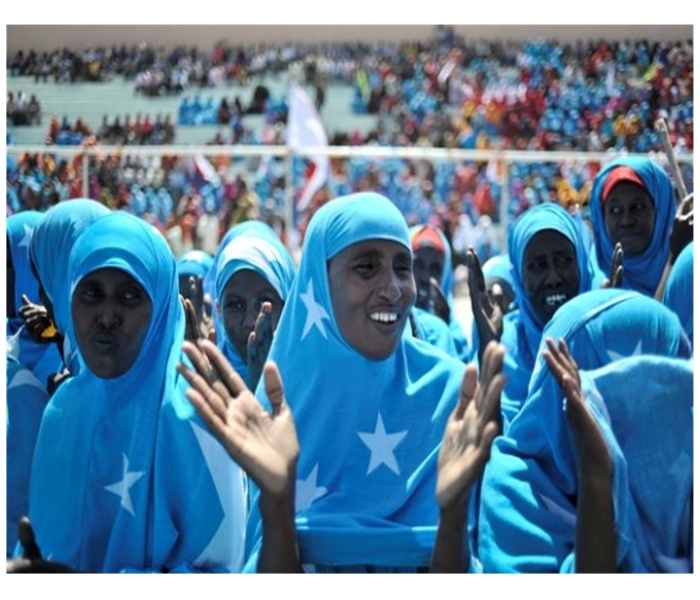Do Somali women have something to celebrate?
Somali women are subjected to unimaginable acts. If women do not start their struggle for women now and form political networks that are not based on clan but on democratic values, they will lose their voice again.
Somalia is heading in the right direction. For the first time in over20 years, the country has a presidential, parliamentary leader and a new constitution is in place.
The new parliamentary system is modeled on the clan system, and a quota for women was supposed to guarantee they would be holding 30per cent of parliamentary seats. Since there is no political system through which female representatives are nominated, women must be appointed by their clan leader. The clan system is a hierarchical system, where the men are at the top of the hierarchy while women are subordinate.
Too few women
Many clans have not appointed their female representative. That does not mean they did not find a worthy representative, but that women have been considered inferior in terms of political participation.
And they are with out clan: women can be born in clan A, but marry in clan B. This creates a dilemma in terms of her credibility: Where is her loyalty and where does she belong? Which clan should she represent? Should it be the clan she is born in and has blood ties to, or the clan she married in to and where her kids are from?
Thus women are between clans. This could bean excellent chance for alliance formation, if women turn the rules to their advantage and reject all collectivist and patriarchal thinking. Men are only concerned with power and money, women can achieve much more if they realize that politics is neither taboon or difficult.
Free as a bird
There Is no doubt that I, and with me many women in Norway, enjoy and share an appreciation for the struggle for women’s rights and the strong and admirable women who fought this battle over100 years ago. Their struggle for justice and equality has givenus today’s society. Even though many countries envy how far we have come in the fight for equality, a lot of work remains to be done. In a number of occupations and educational choices there is virtually no gender equality. It is harmful to believe that we are equaland that the work is done.
But I would argue that women in Norway are free as a bird. They have a system that protects them against injustice, a system that takes care of them when they can`t take care of them selves, and a system that helps them when they are struggling to stand on its own feet.
They are the luckiest women in the world. They can pick and choose the opportunities life offers. But not all women are equally privileged. What about my country women? Do they have something to celebrate?
Strong but invisible
They are strong and brave, but nobody recognizes them. Throughout history they have been the glue that held society together. Unfortunately, they are also subjected to such unthinkable acts as rape, forced marriage, genital mutilation, human trafficking and discrimination. Forced marriage and rape was not part of the tradition I grew up with. In the past, women were honored and respected.
Rape in my opinion is the worst crime a woman may suffer. I remember the time in Somalia where my mentality was “kill or be killed if someone tries to rape me or my family. “I’m glad that neither has happened. Somali women are exposed not only to rape, but gang rape, and the attacker goes free while victims are penalized if they report the rape.
What an unjust life my heroes lead!
The new Somali government has done a good job when it comes to foreign policy. It gained recognition and increased financial support. But in the area of domestic policy, they have shown little action. Poverty, corruption, clan conflicts and human rights violations continue to be part of daily life.
The land has to be built from nothing and aid isn`t just the solution. The country’s authorities must begin to invest in the sole and long-term resources they have, namely people. When basic needs like food and safety are scarce, you do not see the importance of equality in life. Work needs to be done to create more conducive conditions families and civil society, in order to indirectly promote gender equality.
Without an identity
Clan conflict was the cause of the civil war in Somalia. This conflict shattered my dreams, made me become a refugee in several parts of the world, made my kids to be without an identity. And I can`t accept that any longer.
If we are to achieve lasting peace, we must lay our cards on the table and speak openly to one another. Without a process of reconciliation, we are trying to build a house without a foundation. Without trust and forgiveness, we will not retrieve the shield that held the society together.
Taakos time

Taakos time has come. There is a statue of Hawo Taako in Mogadishu with a child on her back, agraterin one hand and a gun in the other hand. The monument illustrates the various roles women have had throughout history. They are mothers, income earners and community patrons.
Women should be valued as the Qur’an says,and nomadic and clan tradition should be dismantled.
The Somali parliament consistsof 275clanmembers, out of which27of who mare women and the restare men.These women are door openers for future female parliamentary leaders. They are highly qualified and have extensive professional experience compared to their male counter parts in parliament.
These women did not come to power because big donors like Norway pushed clan chiefs or supported people in the diaspora. They came to power because grassroots women and women in the diaspora have worked together and shown that they have a voice.
Democratic values
Stronger mobilization is needed now. In less than three years there will be new parliamentary elections in Somalia. If women do not start their struggle for gender equality now and form political networks that are not based on clan but on democratic values, they will lose their voice again and once more be chosen through the clan system.
The Norwegian government has been a major contributor to Somalia and support increase dafter the London conference this year. For Norway’s reputation is extremely important that the money is used where it is needed most. The money must be audited closely and concrete results must be demanded.
One area I hereby propose that the Norwegian authorities should focus on, is the earmarking of resources for activities targeting women and their opportunities for political participation.





